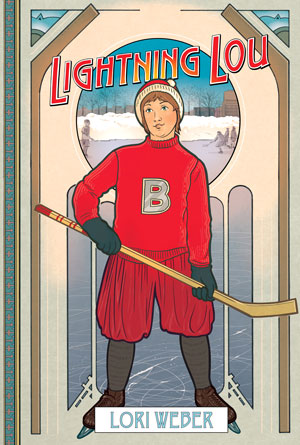| ________________
CM . . .
. Volume XXIII Number 8. . . .October 28, 2016
excerpt:
Lightning Lou is set in a sawmill town in rural Quebec during the First World War. A recruiter for a girls' hockey team is soon to arrive in quest of a strong female player to rival the stars of women's hockey, Albertine Lapensee and Eva Ault. Ault and Lapensee are historical figures profiled in the CBC documentary Hockey: A People's History, as was Ada Lalonde who was recruited from rural Quebec to compete with them. With so many men at war, women's hockey had risen in popularity since 1914. Lou (Louis), a 12-year-old hockey-mad boy, has a bet with his friend Francine that he, dressed as a girl, will beat her in the try-out. As it turns out, both Lou and Francine are chosen to play in the women's league, but when Francine realizes that she must stay home to help her mother, Lou, in his role as a girl, becomes the newest player on the Montreal Bakers team. Lou's reasons for this deception are complex. Ever since his elder brother, Georges, left with the Royal 22nd Regiment (Vingt-Deux) to fight in Europe, their dream of becoming hockey stars together has been put on ice. "If he couldn't be a hero on the battlefield, he could at least try to be one on the ice," Lou thinks. "... [T]here was no way Albertine Lapensee or any other girl could play hockey better than a boy." Needing parental permission to join the team, Lou confides the ruse to his mother who is surprisingly sympathetic, saying that she would rather have Georges dressed as a girl and safe in Quebec than dressed as a soldier in a trench under German fire. She persuades Lou's father to keep quiet when the recruiter comes to take Lou to Montreal to join the team. The ten dollars a month that Lou will earn is almost as much as his father makes at the sawmill. The major area of suspense in Lightning Lou lies in whether or not Lou will be able to maintain his disguise. As he and three girls on the team live with the sister of the Montreal Bakers' owner, comic situations arise over washrooms, shared bedrooms, and Lou's excessive modesty. Off the ice, as a boy, Lou gets a part-time job and is alarmed to overhear speculation that Albertine Lapensee is really a boy, fearing that they will say the same about him. More suspense comes in the subplot concerning Georges. Will he survive the war? Will he come home changed? Young readers who have visited the Hockey Hall of Fame will recognize the names of hockey stars of yesteryear such as Newsy Lalonde and Georges Vezina when Lou has the thrill of being introduced to them. Being away from home, living in a city and travelling with a team broadens Lou's horizons and changes his way of thinking. On the ice, he expects to star but finds, to his surprise, that his roommate Claire, and Albertine Lapensee of the Cornwall, Ontario team, are as good as he is. "This was the hardest hockey he had ever played in his life," he reflects. Lou's respect for girls increases, as well, when he learns of the oppressive social expectations that they have had to fight in order to be on the teams. Many young women tried out for the league to avoid early marriage. Lou's village priest was not alone in speaking out against women's hockey, claiming that the girls would be a spectacle like zoo animals, and that hockey might impair their childbearing capability. Orphan Claire, convent raised, learned hockey from practising with a nun and with brothers from a nearby abbey. Her mentor faced difficulty in securing permission from the church for Claire to join the team for a season; then she must come back and join the order. Throughout the novel, women show their strength in various ways, particularly in one startling scene involving Lou's mother. Lightning Lou is like the classic comedy Tootsie in which a male actor, desperate for work, disguises himself as a woman and secures the leading role in a soap opera. At the end of the movie, the actor, played by Dustin Hoffman, says that he has been a better man than he was before while in the role of a woman. Having to walk a mile in someone else's shoes is bound to be educative, but the author, through Lou, goes further, suggesting that women are innately more nurturing than men, and thus possibly superior. When Lou wonders: "Was it something girls were born with, this talent for looking after people?" many young readers will take his question as a statement of fact. The belief that women are born with a special capacity for caregiving is inaccurate and misguided. It is apparent in everyday life that not all women have a strong caregiving instinct, and that both men and women are capable of kindness, caring, and devotion. Overall, however, Lightning Lou is fast-paced, suspenseful, appealing to both boys and girls, and quietly educative about the controversies surrounding World War I and the oppression of women a hundred years ago. Recommended. Ruth Latta, a writer in Ottawa, ON, is working on a romantic novel about a woman in Canadian history.
To comment
on this title or this review, send mail to cm@umanitoba.ca.
Copyright © the Manitoba Library Association. Reproduction for personal
use is permitted only if this copyright notice is maintained. Any
other reproduction is prohibited without permission.
Next Review | Table of Contents For This Issue - October 28, 2016 |
